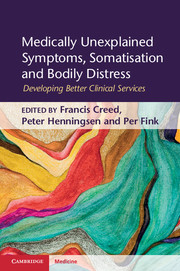Crossref Citations
This Book has been
cited by the following publications. This list is generated based on data provided by Crossref.
Creed, Francis
and
Gureje, Oye
2012.
Emerging themes in the revision of the classification of somatoform disorders.
International Review of Psychiatry,
Vol. 24,
Issue. 6,
p.
556.
Carrington, Anca
Rock, Brian
and
Stern, Julian
2012.
Psychoanalytic thinking in primary care: The Tavistock Psychotherapy Consultation model.
Psychoanalytic Psychotherapy,
Vol. 26,
Issue. 2,
p.
102.
Kapfhammer, H.P.
2012.
Psychopharmakotherapeutische Ansätze bei somatoformen Störungen und funktionellen Körpersyndromen.
Der Nervenarzt,
Vol. 83,
Issue. 9,
p.
1128.
Douzenis, Athanassios
and
Seretis, Dionysis
2013.
Descriptive and predictive validity of somatic attributions in patients with somatoform disorders: A systematic review of quantitative research.
Journal of Psychosomatic Research,
Vol. 75,
Issue. 3,
p.
199.
de Jesus Mari, Jair
Tófoli, Luís Fernando
Noto, Cristiano
Li, Li M.
Diehl, Alessandra
Claudino, Angélica M.
and
Juruena, Mario F.
2013.
Pharmacological and Psychosocial Management of Mental, Neurological and Substance Use Disorders in Low- and Middle-Income Countries: Issues and Current Strategies.
Drugs,
Vol. 73,
Issue. 14,
p.
1549.
Town, Joel M.
and
Driessen, Ellen
2013.
Emerging Evidence for Intensive Short-Term Dynamic Psychotherapy with Personality Disorders and Somatic Disorders.
Psychiatric Annals,
Vol. 43,
Issue. 11,
p.
502.
Creed, F. H.
Tomenson, B.
Chew-Graham, C.
Macfarlane, G. J.
Davies, I.
Jackson, J.
Littlewood, A.
and
McBeth, J.
2013.
Multiple Somatic Symptoms Predict Impaired Health Status in Functional Somatic Syndromes.
International Journal of Behavioral Medicine,
Vol. 20,
Issue. 2,
p.
194.
Udo, Itoro
and
Gash, Amanda
2013.
Management of refractory irritable bowel syndrome and comorbid mental ill-health: challenges, reflections and patient's perspective of life on the body–mind divide.
BMJ Case Reports,
Vol. 2013,
Issue. ,
p.
bcr2013009545.
Paffard, Marguerite
2014.
Acute Medicine.
p.
341.
von Känel, Roland
2015.
Executive Health - Gesundheit als Führungsaufgabe.
p.
57.
Bledowski, Jozef
and
Levenson, James
2015.
The Encyclopedia of Clinical Psychology.
p.
1.
Mobini, Sirous
and
Walla, Peter
2015.
Psychology of medically unexplained symptoms: A practical review.
Cogent Psychology,
Vol. 2,
Issue. 1,
p.
1033876.
Stern, Julian
Hard, Emily
and
Rock, Brian
2015.
Paradigms, politics and pragmatics: psychotherapy in primary care in City and Hackney – a new model for the NHS.
Psychoanalytic Psychotherapy,
Vol. 29,
Issue. 2,
p.
117.
Budtz-Lilly, Anna
Schröder, Andreas
Rask, Mette Trøllund
Fink, Per
Vestergaard, Mogens
and
Rosendal, Marianne
2015.
Bodily distress syndrome: A new diagnosis for functional disorders in primary care?.
BMC Family Practice,
Vol. 16,
Issue. 1,
Adshead, Gwen
and
Guthrie, Elspeth
2015.
The role of attachment in medically unexplained symptoms and long-term illness.
BJPsych Advances,
Vol. 21,
Issue. 3,
p.
167.
Gerskowitch, Chloe
Norman, Ian
and
Rimes, Katharine A.
2015.
Patients with medically unexplained physical symptoms experience of receiving treatment in a primary-care psychological therapies service: a qualitative study.
The Cognitive Behaviour Therapist,
Vol. 8,
Issue. ,
Moulin, Virginie
Akre, Christina
Rodondi, Pierre‐Yves
Ambresin, Anne‐Emmanuelle
and
Suris, Joan‐Carles
2015.
A qualitative study of adolescents with medically unexplained symptoms and their parents. Part 1: Experiences and impact on daily life.
Journal of Adolescence,
Vol. 45,
Issue. 1,
p.
307.
Pallesen, Karen Johanne
Dahlgaard, Jesper
and
Fjorback, Lone
2016.
Mindfulness and Buddhist-Derived Approaches in Mental Health and Addiction.
p.
165.
Bass, Christopher
and
Pearce, Steve
2016.
Severe and enduring somatoform disorders: recognition and management.
BJPsych Advances,
Vol. 22,
Issue. 2,
p.
87.
Kämmerer, Wolfgang
2016.
Auf der Suche nach dem Wort, das berührt.
p.
39.



